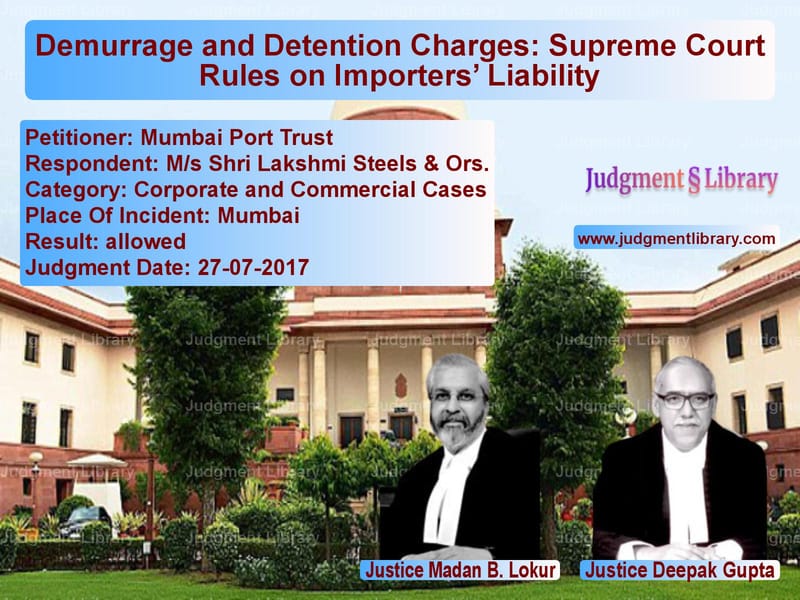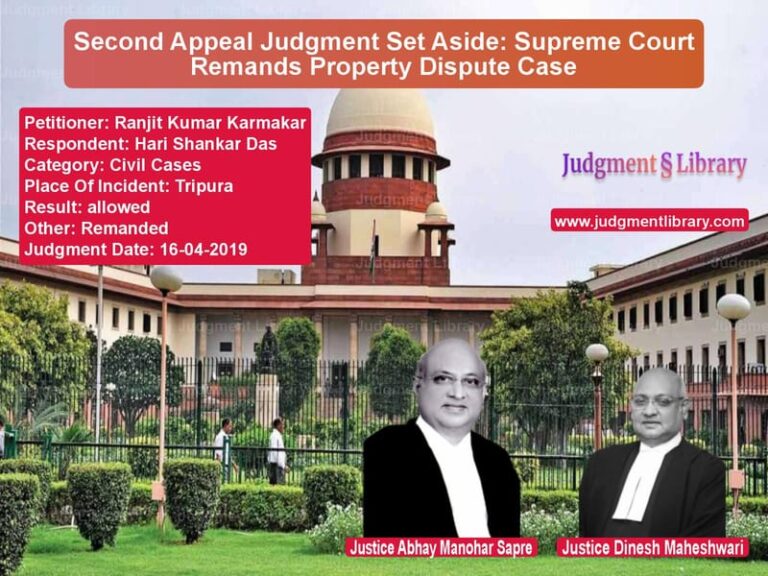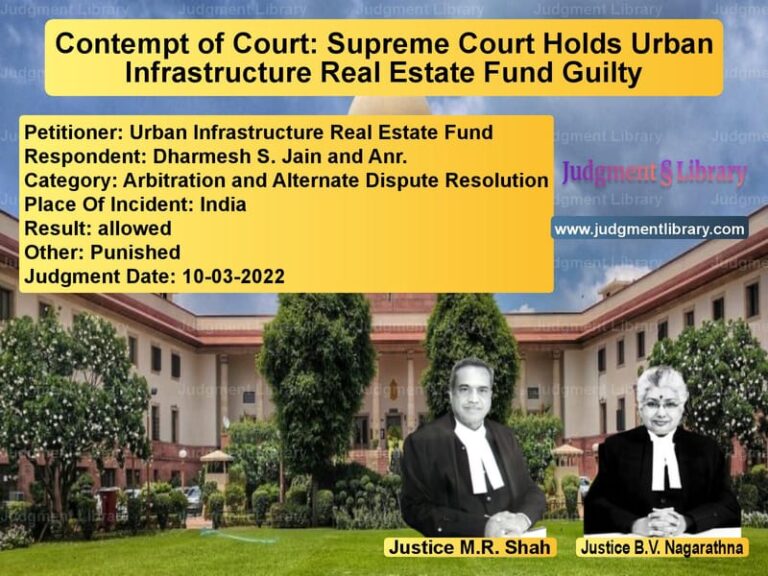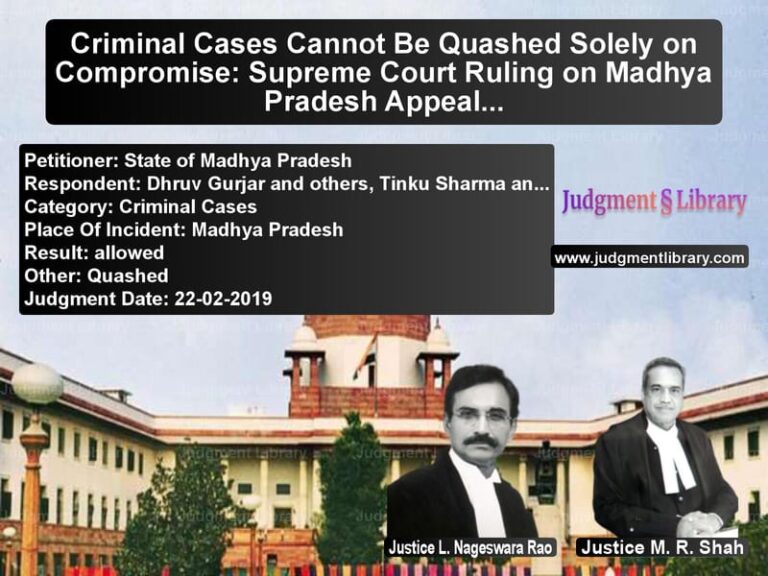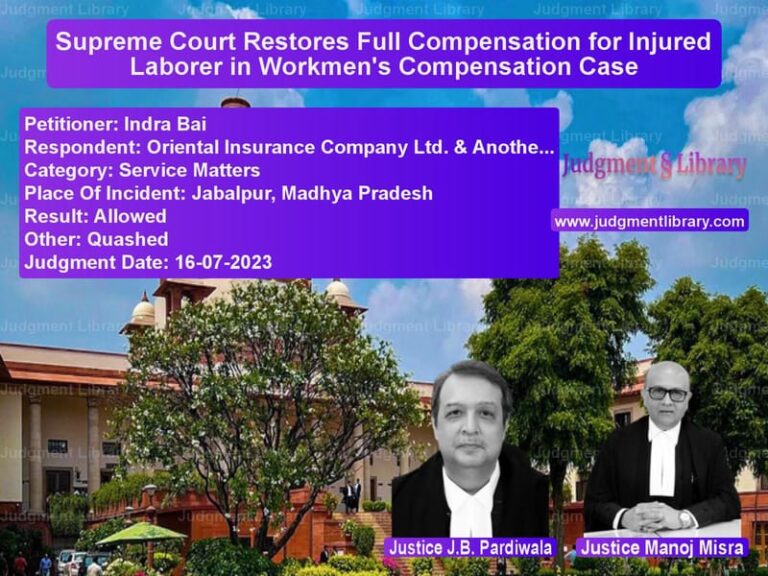Demurrage and Detention Charges: Supreme Court Rules on Importers’ Liability
The Supreme Court’s judgment in Mumbai Port Trust vs. M/s Shri Lakshmi Steels & Ors., delivered on July 27, 2017, addressed a crucial dispute regarding the liability of importers to pay demurrage and detention charges when their goods are held by customs authorities. The ruling clarified that even if the delay in clearance of goods is due to customs authorities, importers remain liable for demurrage and detention charges unless mala fide actions by customs officials are established.
The case arose from a dispute between Mumbai Port Trust and importers of cold rolled steel coils, whose goods were detained by the Directorate of Revenue Intelligence (DRI) on suspicion of duty evasion. The Punjab & Haryana High Court had ruled in favor of the importers, directing that demurrage should not be charged by the port, and the Customs/DRI should bear the detention charges. However, the Supreme Court overturned this decision, emphasizing the statutory rights of the port authorities to collect such charges.
Background of the Case
The dispute involved two sister concerns, Inder International and M/s Shri Lakshmi Steels, engaged in the import and trading of cold rolled steel coils and sheets. They had imported ten consignments between December 4, 2015, and December 29, 2015. However, the Directorate of Revenue Intelligence (DRI) suspected misdeclaration to evade safeguard duties and placed the consignments on hold.
The timeline of key events was as follows:
- December 4, 2015: First batch of consignments was imported.
- December 11, 2015 & December 29, 2015: Further consignments were imported.
- December 14, 2015: DRI instructed customs to place the consignments on hold for 100% examination.
- December 18, 2015: Importers requested duty assessment and release of goods.
- January 19, 2016: Chartered Engineer certified the goods as cold rolled coils, supporting the importers’ claims.
- January 28, 2016: Customs allowed provisional release of goods upon submission of a bond and bank guarantee.
- February 5, 2016: DRI refused to issue a detention certificate.
- April 4, 2016: Punjab & Haryana High Court directed customs to release the goods.
- July 12, 2016: High Court held that demurrage should not be levied, and DRI/Customs should bear detention charges.
Arguments by the Petitioners (Mumbai Port Trust & Union of India)
The appellants contended:
- The Port Trust had a statutory right to levy demurrage charges irrespective of customs detention.
- Regulation 6(1) of the Handling of Cargo in Customs Areas Regulations, 2009, which prohibits charging demurrage on detained goods, cannot override the Major Port Trusts Act, 1963.
- The High Court erred in holding the Customs/DRI liable for detention charges.
- The importers were offered provisional release but failed to take timely action, leading to higher demurrage.
Arguments by the Respondents (Importers)
The importers argued:
- The delay in clearance was due to customs authorities and DRI, making it unjust to levy demurrage.
- As per Regulation 6(1) of the 2009 Regulations, the Port Trust could not charge demurrage on detained goods.
- They were unfairly asked to furnish a bank guarantee, unlike other importers who were allowed release based on a bond alone.
- The customs officials acted in a mala fide manner by subjecting them to harsher conditions.
Supreme Court’s Observations
The bench, comprising Madan B. Lokur and Deepak Gupta, made the following observations:
“Even if the importer is not at fault, it is the importer alone who is liable to pay the demurrage charges.”
“Regulations framed under the Customs Act cannot override the statutory provisions of the Major Port Trusts Act, which entitles port authorities to levy charges.”
“A direction to customs or DRI to bear demurrage/detention charges can only be given in cases where mala fide actions by officials are established.”
Supreme Court’s Judgment
The Supreme Court ruled that:
- The Mumbai Port Trust had the legal right to levy demurrage under the Major Port Trusts Act, 1963.
- Regulation 6(1) of the 2009 Customs Regulations does not override the Port Trust’s statutory rights.
- Importers remain liable for demurrage charges even if customs authorities delay clearance.
- No specific mala fide actions by customs officials were proven, hence, DRI/Customs cannot be directed to bear the detention charges.
- Importers could have availed provisional release earlier to avoid mounting demurrage but failed to do so.
- Importers were free to approach the Port Trust under Section 53 of the Major Port Trusts Act to seek remission of demurrage, but no general waiver could be granted.
Key Takeaways
- Importers’ Liability for Demurrage: Importers must bear demurrage charges even if customs delay clearance.
- Port Trusts’ Rights Upheld: Statutory provisions of the Major Port Trusts Act override customs regulations.
- No Automatic Exemption: Even if customs detains goods, demurrage is chargeable unless mala fide action is proven.
- Encouragement for Provisional Release: Importers must take steps to clear goods early to avoid financial burdens.
Conclusion
The Supreme Court’s ruling in Mumbai Port Trust vs. M/s Shri Lakshmi Steels reaffirms the liability of importers to pay demurrage and detention charges even when goods are held by customs authorities. It upholds the statutory rights of port trusts and clarifies that customs regulations cannot override established laws governing port tariffs. The decision serves as a guiding precedent for future cases involving demurrage disputes and reinforces the importance of proactive measures by importers to mitigate financial liabilities.
Don’t miss out on the full details! Download the complete judgment in PDF format below and gain valuable insights instantly!
Download Judgment: Mumbai Port Trust vs Ms Shri Lakshmi Ste Supreme Court of India Judgment Dated 27-07-2017.pdf
Direct Downlaod Judgment: Direct downlaod this Judgment
See all petitions in Contract Disputes
See all petitions in Bankruptcy and Insolvency
See all petitions in Corporate Compliance
See all petitions in Judgment by Madan B. Lokur
See all petitions in Judgment by Deepak Gupta
See all petitions in allowed
See all petitions in supreme court of India judgments July 2017
See all petitions in 2017 judgments
See all posts in Corporate and Commercial Cases Category
See all allowed petitions in Corporate and Commercial Cases Category
See all Dismissed petitions in Corporate and Commercial Cases Category
See all partially allowed petitions in Corporate and Commercial Cases Category

